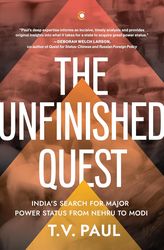Thazha Varkey Paul, distinguished James McGill Professor of International Relations at McGill University, Montreal, is a well-known academic in his chosen field. He has 24 books to his credit, and there are two more on the way. He has been president of the International Studies Association and was a key figure in the formation of the Global Research Network for Peaceful Change.
In his latest book, The Unfinished Quest, he explores India's search for its day in the sun as a global power, a search stretching from Nehru to Modi and continuing. “Taking a leadership role in the fight for moral causes not only rights the wrongs of an international order perpetrated by an unequal system, in particular by western imperialism, colonialism, and racialism but also can enhance a country's international status,” writes Paul.
Thus, when the country gained independence after a long struggle waged following the principle of non-violence, Nehru's immediate policy reaction was respect for the United Nations and its call for a ceasefire in Kashmir. As the world gradually got rid of the last vestiges of colonialism, India played a significant role in bringing non-aligned countries together into a Non-Aligned Movement, courted by both the US and the Soviet Union. Nehru had an affinity for both. While he was firmly attached to the concept of Westminster-style democracy, he was inclined, on the economic side, to Fabian socialism. Nehru was a colossal figure in the global arena in the fifties but received a body blow in 1962 after China exposed our limitations.
India's position as an Asian power has been challenged over the years by both Pakistan and China. Pakistan tried its hand in 1965 but failed to make headway in the manner it expected. The sudden death of prime minister Lal Bahadur Shastri led to the long-drawn regime of Indira Gandhi. She had more internal issues to settle than Nehru and looked inward for the first few years.
Meanwhile, the partnership between the US and Pakistan had become well-rooted, as the US considered Pakistan a more reliable ally than India in its Cold War against the Soviets. India's image took a decisive upturn after the 1971 war against Pakistan and the liberation of Bangladesh. In the 1980s, India's attempt to quell the rebellion of the Tamil Tigers in Sri Lanka failed, and this, too, impacted our global position. The subsequent positive status markers for India were the nuclear tests at Pokhran, the economic reforms of 1991, and the civil nuclear deal of 2005, which marked the end of 'nuclear apartheid'.
The author distinguishes between 'soft power' and 'hard power' and the impact it has on status. India's soft power was consistently recognised, but our hard power took an upswing only after the economic reforms of 1991. With respect to military power and nuclear power, India is still behind the big powers, but our economic power has grown multifold. This gave India new muscle and a different status, far removed from the third-world image that the country had in most of the second half of the 20th century.
Future success depends on accelerating economic progress. This does not mean just growth in GDP or per capita income but improvement in the living standards of the people, better education and better health care. Aggressive hindutva will not take the nation forward in its quest for power but may well result in regression. Says the author, “If India's ascent and accommodation take place peacefully, it will challenge the theoretical and empirical narrative that great power status is achieved only by spilling the blood of oneself and others.”
A well-researched and well-written book.
Chandrasekhar is former cabinet secretary.
THE UNFINISHED QUEST: INDIA’S SEARCH FOR MAJOR POWER STATUS FROM NEHRU TO MODI
Author: T. V. Paul
Publisher: Context, Westland Books
Date of Publishing: 11 November 2024
Price: Rs. 699
Pages: 280 pages


